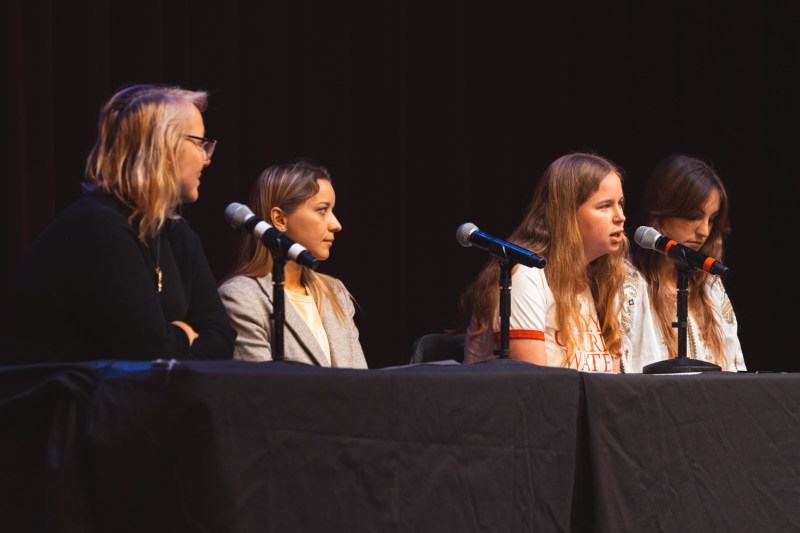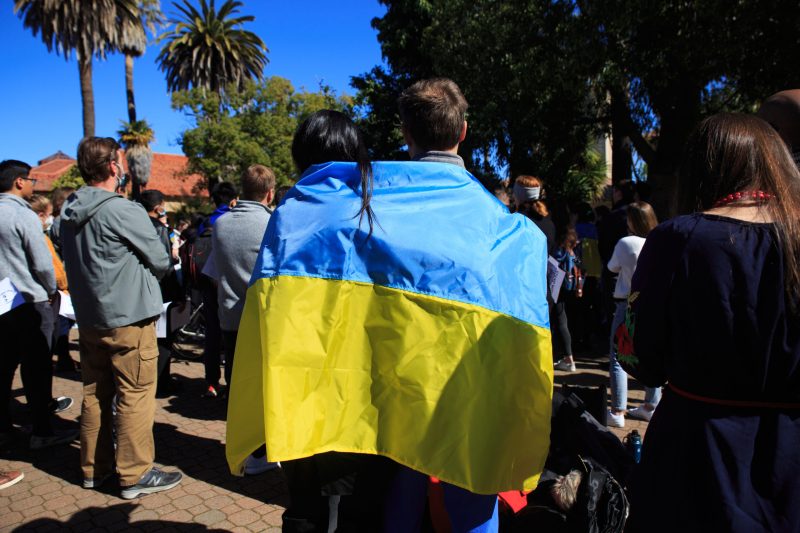For Ukrainian students Catarina Buchatskiy ’24, Kateryna Slunkova MBA ’22 and Alex Gureiev MBA ’23, February was the month when everything changed. While most students were planning for midterms, the three students born or raised in Ukraine were planning for a world where their home no longer exists. Over the summer, they shared their experiences as Ukrainians on campus and their time since the invasion.
All three students are currently involved in projects aimed at helping Ukraine, which have included fighting for cultural preservation, calling out companies financing and operating in Russia and organizing a Stanford address with Ukrainian President Volodymyr Zelenskyy.

Catarina Buchatskiy
Buchatskiy has lived in many places in the world — Chicago, Boston, California, Ukraine and Brazil. However, if she were to live in one place for the rest of her life, it would be Ukraine.
“When I was living in Kyiv, I felt as if it was growing with me. Ukraine only gained its independence in 1991. I am 21, and I feel as though a lot of Kyiv’s major milestones have aligned with my personal milestones,” Buchatskiy said. “I think that’s why I have a very personal stake in Kyiv’s success, because it feels like a city I grew up with, and I want to see it succeed just as much as I want to see my hopes and dreams come true.”
Buchatskiy, who is studying international relations, said the University’s support of Ukraine was appreciated but imperfect.
In comparison to other American universities, she said that the Stanford community has gone “above and beyond” in support of Ukraine and its people through various events and fundraisers, which have garnered thousands of dollars. She also said University staff and faculty were extremely understanding of her situation, allowing her to leave campus early in the spring quarter and waiving final assignments.
Looking farther out than Stanford, Buchatskiy has also seen concerning reactions within Western society in response to the war.
First appearing on Instagram, Twitter, TikTok and Facebook in response to the 2014 Crimean crisis, the hashtag “#NotAllRussians” has been used in defense of Russian civilians, especially during times of war. Growing in popularity since the February invasion, it asserts that, despite the decisions made by Russia’s government and leaders, not all Russians are at fault.
“I am not in the camp of ‘#NotAllRussians,’” Buchatskiy said. “I don’t agree with the Western dialogue of ‘this is Putin’s war and it’s not the fault of all Russians’ because, in the past, we’ve set the precedent and understood that, in order for something of this scale to happen, every single person takes responsibility. Without it, you can’t execute such a massacre or genocide.”
After an invitation from the Chamber of Commerce, which hosted a program highlighting opportunities for expansion in the American apparel market, Slunkova moved to the U.S. in 2018 and soon found herself at Stanford as a dual-degree student.
Since Russia’s military invasion, she said, she has felt a very significant shift in her relationships with fellow Ukrainians, as well as with other peers who have shown overwhelming signs of support within the past few months.
Kateryna Slunkova
Slunkova, the leader of the Stanford Ukrainian Student Association, said the community of Ukrainian students has grown stronger: “Before, we had a group of people coming together once a month to chat about the latest news, but there was no Ukrainian family at Stanford as there is now.”
Slunkova visited family in Ukraine in the summer of 2021, not realizing then that she wouldn’t be able to fly home the following year. Currently, her father and grandparents are still residing in Ukraine, while her mother evacuated to Poland in June.
“I’ve been very aware that it’s dangerous,” Slunkova said. “I don’t want to even put my family through the stress of thinking. For them, it’s a big peace of mind knowing that at least some portion of their family is out of the danger zone.”
Slunkova said the dynamic between Ukrainian and Russian students has changed in recent months. She said that she saw empathy between Russians and Ukrainians on campus — Russian families don’t “have it easy” either, as they are dealing with various economic implications, canceled visas, less employment options and more, Slunvoka said.
However, she also puts Ukraine first. She knows that, first and foremost, she has to put Ukraine first and prioritize the lives of the Ukrainian people.
Despite her personal sympathy, the Ukrainian Student Association “will not collaborate with Russians or Russian associations, because we need to make sure that Ukrainians are comfortable first,” Slunkova said. “I will always try to adapt to the person with the most sensitive needs.”
Alex Gureiev
Alex Gureiev and his six-year-old daughter recently attended a concert of the North Carolina Symphony. Although not a “very emotional person,” Gureiev felt incredibly moved by the music he heard, to the point where he “didn’t have enough air to breathe, and there were tears in [his] eyes.”
However, once he found out that the composer was Russian, his love for the music stopped.
“I realized that I am so traumatized by the events in my country, that for me it is impossible to celebrate Russian culture anymore,” Gureiev said. According to him, this feeling is unfortunately common among Ukrainians he has spoken with.
Born and raised in eastern Ukraine, Gureiev also decided to stop speaking Russian and associating himself with the country, although he spoke Russian growing up. He made this decision after Ukraine’s Revolution of Dignity in 2014 and the subsequent Russian occupation of Crimea.
The ongoing war only reinforced his view of the situation: “black and white, without a gray area.” This shift toward Ukrainian culture was difficult because he had not previously spoken or used Ukrainian outside of academic readings.
Like Buchatskiy and Slunkova, Gureiev said that the way his peers interacted with him, and his connection to the Ukrainian community at Stanford has changed drastically. Part of this shift included the Ukrainian Student Association shifting from an informal community association to an official student organization, with more recognition.
According to Gureiev, the Ukrainian Student Association has held several humanitarian missions. They invited President Zelenskyy to address students and have held many events, including a vigil for the children of Ukraine and Run for Children of Ukraine.
“Things aren’t over yet, though,” Gureiev said. Because, despite the overwhelming encouragement, people’s attention towards Ukrainian news has gone away.
“Each day, hundreds of innocent people die. Someone’s father, someone’s wife, someone’s kid,” he said. In the second half of June, more than 200 missiles attacked Ukrainian territory, with surprise attacks still targeting Ukraine’s strongest areas in late July.
Gureiev said Ukrainians were thankful for “help from around the world,” but called for continued support and involvement. “The war is not over.”
